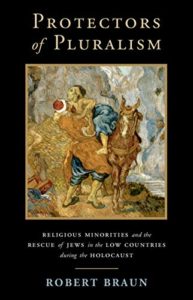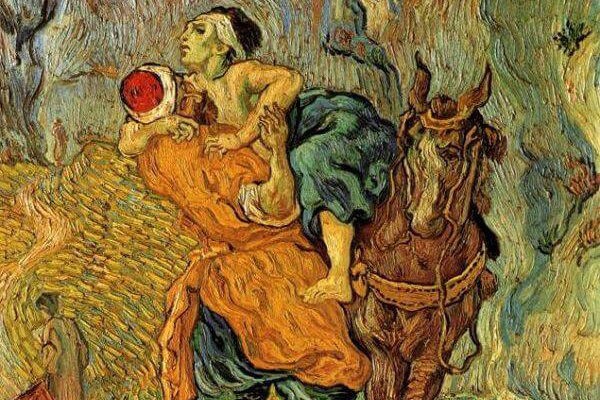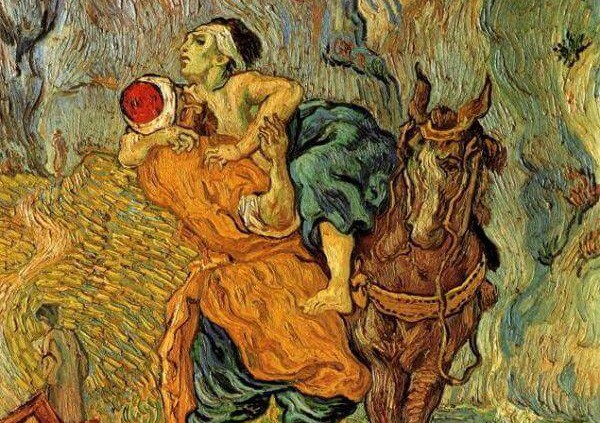Sometimes an obscure social science dissertation about historical events tells you exactly what you need to know about what is going on right now.
I have just read a little-noticed 2019 book called Protectors of Pluralism: Religious Minorities and the Rescue of Jews in the Low Countries during the Holocaust. This fascinating study, which began as a dissertation, was written by political scientist Robert Braun, who is from the Netherlands and is now an assistant professor at Berkeley. I was asked to review the book because my own 1993 dissertation was on Christians who rescued Jews during the Holocaust. This new book far surpasses my own work and anything else I have seen on the subject.

David Gushee
Braun studies in staggering detail the rescue (and non-rescue) of Jews during the Holocaust as it unfolded in his home country of Holland and in neighboring Belgium. Using a highly technical statistical methodology that I cannot begin to explain, but also much other data including historical archives and interviews, Braun shows that local religious minorities across Holland and Belgium were far more likely to save Jews than were local religious majorities.
In other words, Catholics did better in rescuing Jews in areas where Catholics were a minority religious community. Dutch Reformed Church Protestants also did better at rescue where they were a minority in the local community. Tiny splinter Protestant sects did better all over both countries, and they were a minority wherever they were.
This means if you were a Jew in Antwerp desperately looking for help for your family, you would not want to go to clergy or members of the large Catholic cathedral, but instead you would seek out a little Dutch Reformed Church. And if you were in Amsterdam, you would want to find a little Catholic church somewhere nearby rather than look to a large nearby Dutch Reformed Church.
Outsiders found to be more compassionate
Braun says this pattern holds for two reasons: both a greater likelihood of empathy for the Jewish plight among members of local religious minorities and a greater capacity to build and sustain a successful rescuer network under conditions of tremendous threat and risk.
“Religious outsiders consistently demonstrated greater empathy for Jews than did members of local majorities.”
Religious outsiders consistently demonstrated greater empathy for Jews than did members of local majorities. They were much less susceptible to the seduction on offer from Nazis (or locals) appealing to some awful vision of racial purity or a Jew-free Holland/Belgium.
Another way to say it is that minority religionists were much less likely to mix their Christianity with fascism than were local majority religious folk. And really, all it took was indifference to Jewish suffering to prevent rescue and ensure that local Jews ended up on trains going toward Auschwitz. Such indifference was much less likely among religious minorities.
 Meanwhile, the internal group dynamics of such local religious minorities made it easier for them to form successful rescuer networks. Once empathy was activated and rescue considered, small, close-knit and mutually reliant religious communities led by clergy who knew whom to trust aided the building of brave, impermeable rescuer networks. In majority religious contexts, unfortunately, efforts of empathetic Christian leaders to build rescue networks were often ruined by pro-Nazi informants from within their own churches, who snitched on their own pastors, leading to their arrests and sometimes their murders.
Meanwhile, the internal group dynamics of such local religious minorities made it easier for them to form successful rescuer networks. Once empathy was activated and rescue considered, small, close-knit and mutually reliant religious communities led by clergy who knew whom to trust aided the building of brave, impermeable rescuer networks. In majority religious contexts, unfortunately, efforts of empathetic Christian leaders to build rescue networks were often ruined by pro-Nazi informants from within their own churches, who snitched on their own pastors, leading to their arrests and sometimes their murders.
Minority status moves more to action
One of Braun’s most staggering conclusions is that it was local minority status rather than the proclaimed beliefs of the religious group that made all the difference. In other words, whatever the religious claims of the group, whatever its purported understanding of God and the Bible, its participants proved much more empathetic and much more capable of resisting genocide where that group was in the minority.
Stretching far afield as his book concludes, Braun demonstrates this point with examples from all over Europe during the Holocaust and all over the world’s other genocides. He also extends it to other kinds of local minorities, including ethnic and political minorities. Minorities, religious and otherwise, seemed to perform better morally than majorities do. In a nod to our old friend Jerry Falwell Sr., perhaps “Moral Majority” is an oxymoron.

Robert Braun
Braun, who reveals dramatically at the end of the book that his family was murdered in the Low Countries during the Holocaust, resists drawing normative religious and political conclusions from this data, but I will throw caution to the wind and give it a try. That’s because I think his thesis has tremendous explanatory power related to American religion and politics today.
It sure looks like being a part of a religious majority can be hazardous to one’s moral health. And being part of a religious majority that feels embattled — or is susceptible to demagogues who can make it feel embattled, whether it really is or not — is especially morally dangerous. Majority religious groups — then and now — seem more susceptible to exclusivist appeals, more protective of their social status and privilege, less in touch with the empathy taught by their own faith, and less able to ensure that their own members can tell the difference between their religion and, say, fascism.
Meanwhile, being part of a religious (or other) minority tends to create the conditions for greater empathy, greater identification with the suffering of other truly vulnerable groups, and something like an inoculation against majoritarian religio-fascist appeals. In other words, morally speaking, the view is much clearer from the margins than from the center.
Ring any bells with anyone? Now I must try to make the contemporary turn.
A lesson for America today
When I watch Fox News, or listen to some of the speakers at the Republican National Convention, or review the publicly spoken (and withheld) words of President Donald Trump, I see a fading but still potent religio-cultural-racial majority proving susceptible to right-wing appeals — nationalist, authoritarian, angry, defensive, often race-laden if not openly racist, often heavily armed, and often wrapped in religious packaging. Even here there is a center and a margin, a range of views expressed, and so on.
But let’s just say that if one is looking to today’s Trumpist GOP and its most ardent white Christian followers for consistent empathy directed toward the suffering of marginalized U.S. racial and religious groups, one is looking in the wrong place.
For the first time in my nearly 30-year career as a Christian ethicist, this year I am making a public political endorsement — of the Biden-Harris Democratic ticket — and will be actively involved in efforts to advance their cause. I am doing this in large part because I believe in the other way lies an increasingly paranoid religious-political majoritarianism of a type that has so often proved disastrous in human history. That settles the matter for me.
David P. Gushee is Distinguished University Professor of Christian Ethics and Director of the Center for Theology and Public Life at Mercer University. He is the past-president of both the American Academy of Religion and Society of Christian Ethics. He is an author or editor of 25 books, including Righteous Gentiles of the Holocaust, Kingdom Ethics, The Sacredness of Human Life, and Changing Our Mind. Gushee’s newest release, After Evangelicalism, will be out later this month. He earned the Ph.D. from Union Seminary. David and his wife, Jeanie, live in Atlanta.
More by David Gushee:
How to win the war between keeping the peace and telling the truth
The Supreme Court term: Something for everyone to love and hate


